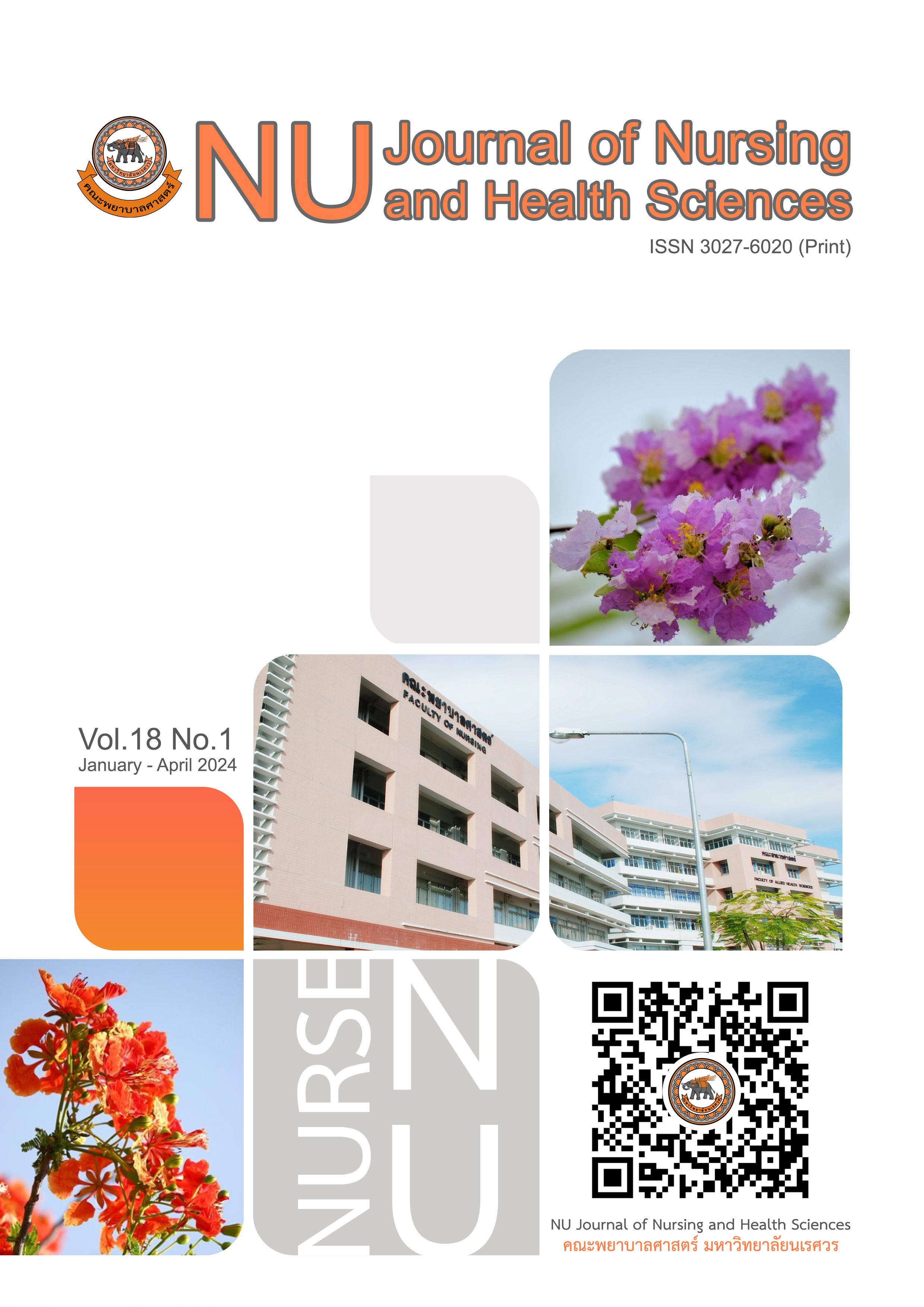ผลกระทบทางสุขภาพและพฤติกรรมการส่งเสริมสุขภาพเด็กวัยก่อนเรียนในผู้ปกครองของสถานศึกษาที่จัดการเรียนการสอนออนไลน์ในสถานการณ์การแพร่ระบาดของโรคติดเชื้อไวรัสโคโรนา 2019
Main Article Content
บทคัดย่อ
การวิจัยครั้งนี้มีวัตถุประสงค์เพื่อสำรวจผลกระทบทางสุขภาพของเด็กวัยก่อนเรียนพฤติกรรมการส่งเสริมสุขภาพเด็กวัยก่อนเรียนและปัจจัยที่มีความสัมพันธ์กับพฤติกรรมการส่งเสริมสุขภาพเด็กวัยก่อนเรียนของผู้ปกครองในสถานศึกษาที่จัดการเรียนการสอนออนไลน์นานกว่า 3 เดือนในสถานการณ์แพร่ระบาดของโรคติดเชื้อไวรัสโคโรนา2019กลุ่มตัวอย่างเป็นผู้ปกครองเด็กที่กำลังศึกษาอยู่ในศูนย์พัฒนาเด็กเล็ก ในเขตเมืองของอำเภอเมือง จังหวัดพิษณุโลก จำนวน 206 คนเครื่องมือที่ใช้ในการวิจัย ได้แก่ แบบสอบถามผลกระทบทางสุขภาพ และแบบสอบถามพฤติกรรมการส่งเสริมสุขภาพเด็กวัยก่อนเรียนของผู้ปกครอง มีค่าความเชื่อมั่น เท่ากับ .81 และ .98 ตามลำดับ วิเคราะห์ข้อมูลโดยใช้สถิติเชิงพรรณนา สถิติ Point-biserial correlation และ สถิติ Pearson correlation coefficient ผลการวิจัยพบว่า ผลกระทบทางสุขภาพของเด็กวัยก่อนเรียนในสถานศึกษาที่จัดการเรียนการสอนออนไลน์นานกว่า 3 เดือน ในสถานการณ์แพร่ระบาดของโรคติดเชื้อไวรัสโคโรนา2019 ได้แก่ การมีน้ำหนักตัวมากกว่าก่อนเรียนออนไลน์ และมากกว่าเกณท์ปกติถึงร้อยละ 76.2 มีพัฒนาการระดับดี โดยมีค่าเฉลี่ย = 37.88 (S.D. = 3.27 ) และภาวะสุขภาพร่างกายโดยรวม อยู่ในระดับดี โดยมีค่าเฉลี่ย = 54.4 (S.D. = 4.18) พฤติกรรมการส่งเสริมสุขภาพเด็กวัยก่อนเรียนของผู้ปกครอง โดยรวมอยู่ในระดับมาก โดยมีค่าเฉลี่ย = 3.48 (S.D. = 0.42) ทั้งนี้ไม่พบปัจจัยใดที่มีความสัมพันธ์กับพฤติกรรมการจัดการสุขภาพเด็กวัยก่อนเรียนของผู้ปกครองในสถานศึกษาที่จัดการเรียนการสอนออนไลน์ในสถานการณ์การระบาดของไวรัสโคโรนา 2019ดังนั้น ควรให้ความรู้แก่ผู้ปกครองเรื่องการส่งเสริมสุขภาพเด็กวัยก่อนเรียน เพื่อป้องกันภาวะน้ำหนักเกิน ปัญหาด้านอารมณ์ และการติดเชื้อทางเดินหายใจในเด็กวัยก่อนเรียน
Article Details

อนุญาตภายใต้เงื่อนไข Creative Commons Attribution-NonCommercial-NoDerivatives 4.0 International License.
เอกสารอ้างอิง
American Academy of Pediatrics Announces New Recommendations for Childrens Media Use. (2020). Retrieved from https://pathwaypeds.com/american-academy-of-pediatrics-announces-new-recommendations-for-childrens-media-use/
Barnett, W. S., & Jung, K. (2021). Seven impacts of the pandemic on young children and their parents: Initial findings from NIEER's December 2020 preschool learning activities survey. Retrieved from https://nieer.org/wp-content/uploads/2021/02/NIEER_Seven_Impacts_of_the_Pandemic_on_Young_Children_and_their_Parents.pdf
Bowden, V. R., & Greenberg, C. S. (2014). Principle and physiologic basis of growth and development. In Children and Their Families: The Continuum of Nursing Care (3rd ed.). Philadelphia, PA: Lippincott Williams & Wilkins.
Champeaux, H., Mangiavacchi, L., Marchetta, F., & Piccoli, L. (2022). Child development and distance learning in the age of COVID-19. Review of Economics of the Household, 20, 659-685.
Christner, N., Essler, S., Hazzam, A., & Paulus, M. (2021). Children’s psychological well-being and problem behavior during the COVID-19 pandemic: An online study during the lockdown period in Germany. PLoS ONE 16(6): e0253473. https://doi.org/10.1371/journal.pone.0253473
Chumprasert, T. (2019). Relationship between the use of electronic media and development of children aged 2-5 years at child development centers under local government organization. Master thesis, Prince of Songkhla University, Songkhla. [In Thai].
Chutwirote, A. (2018). Health and health promotion for early childhood in Kamphaeng Phet Community. Paper Presented at the first Kamphaeng Phet Rajabhat University National Conference, Research and Development Institution, Kamphaeng Phet Rajabhat University, Thailand. [In Thai]
Feldman, D. H. (2012). Cognitive development in childhood: A contemporary perspective. In I. B.Weiner (Ed.), Handbook of Psychology: Vol 6 Developmental Psychology (pp. 197–214).
New York: Wiley. Jia, P., Zhang, L., Yu, W., Yu, B., Liu, M., Zhang, D., & Yang, S. (2020). Impact of COVID-19 lockdown on activity patterns and weight status among youths in China: the COVID-19 impact on lifestyle change survey (COINLICS). International Journal of Obesity, 45, 695-699. https://doi.org/10.1038/s41366-020-00710-4
Karta, I., W., & Rasmini, N., W. (2020). The description of early childhood growth and development with online learning based on authentic assessments. Advances in Social Science, Education and Humanities Research, 556, 245-250.
Kuhfeld, M., & Tarasawa, B. (2020). The COVID-19 slide: What summer learning loss can tell us about the potential impact of school closures on student academic achievement. NWEAResearch. Retrieved from https://files.eric.ed.gov/fulltext/ED609141.pdf
Ministry of Public Health, Department of Mental Health. (2015). Annual Report of the Department of Mental Health, 2015. Division of Planning, Department of Mental health, Nonthaburi. [In Thai]
Nagata J. M., Abdel Magid, H. S., & Gabriel, K. P. (2020). Screen time for children and adolescents during the coronavirus disease 2019 pandemic. Obesity, 28(9), 1582–1583. https://doi.org/10.1002/oby.22917
Office of the Education Council, Ministry of Education. (2018). Educational statistics in Thailand, academic year 2016-2017. Retrieved from https://edu.kps.ku.ac.th/DBresearch/document/1/1634-file.pdf
Pattanaponthorn, J., Boonsuwan, C., & Thanajaroenwatchara, N. (2014). The study of Thai Early child Development. Retrieved from https://hp.anamai.moph.go.th/th/research-person/download?id=73769&mid=35022&mkey=m_document&lang=th&did=24069. [In Thai].
Patrick, S. W., Henkhaus, L. E., Zickafoose, J. S., Kim, L., & Halvorson, A. (2020). Well-being of parents and children during the COVID-19 pandemic: A national survey. Pediatrics, 146(4), 1-8 https://doi.org/10.1542/peds. 2020-016824
Pender, N. J. (1996). Health promotion in nursing practice (3rd ed). Stamford, CT: Appleton & Lange.
Pengpan, K. (2019). The roles of parents in preventing health problems of pre-school children. Thai Journal of Nursing and Midwifery Practice, 6(2), 131-142. [In Thai]
Phangsanga, D., & Khayankij, S. (2021). Parents’ roles in promoting preschooler’s health care during the Spread of COVID-19 in Watamaintraram School. An Online Journal of Education (Internet).16(2). [In Thai]
Plotka, R., & Guirguis, R. (2022). Distance learning in early childhood during the covid-19 crisis: family and educators’ experences. Early Childhood Education Journal. https://doi.org/10.1007/s10643-022-01384-5.
Prime, H., Wade, M., & Browne, D. T. (2020). Risk and resilience in family well-being during the COVID-19 pandemic. American Psychology. 75(5): 631–43. https://doi.org/10.1037/amp0000660 PMID: 32437181
Surekha, B. C., Karanati, K., Venkatesan, K., Sreelekha, B. C., & Kumar, V. D. (2022). E-learning during COVID-19 pandemic: A surge in childhood obesity. Indian Journal Otolaryngology Head Neck And Surgery, 74(Suppl 2), S3058-S3064.
Thuamphet, P., & Hemchayat, W. (2021). Parents’ opinions towards well-being of preschooler during the Covid-19 pandemic situation in Phasukmaneejak School. An Online Journal of Education, 16(2),www.tci-thaijo.org/index.php/OJED. [In Thai]
Trakulbangkla, P., Sankapong, W., & Roonnajuk, C. (2022). Home-based learning for young children during Coronavirus pandemic (COVID-19). Journal of Educational Studies, 16(1), 32-41. [In Thai]
Tudsri, P. (2014). Factors associate with nutritional status among pre-school children in Muang District,Pathumtani Province. Journal of Nursing and Halth Care, 32(1), 69-77. [in Thai]
United Nations Children's Fund, World Health Organization, & The International Federation of Red Cross and Red Crescent Societies. (2020). Key Messages and Actions for COVID-19 Prevention And Control in Schools. Retrieved from https://www.who.int/publications/m/item/key-messages-and-actions-for-covid-19-prevention-and-control-in-schools
Watcharaach, J., Kanchanaudom, P., & Wankrathok, S. (2011). Health promoting behaviors of the child care providers for preschool children in the child development center, Chon Buri Province. The Public Health Journal of Burapha University, 6(2), 110-118. [In Thai]
Yamane, T. (1967). Statistics: An Introductory Analysis. (2nd ed.). New York: Harper and Row.
Yeepaloh, M., Kajornkittiya, K., Lohmae, U., Salaebing, S., & Dowrote, N. (2022). Factors influencing early childhood health care behaviors of parents or guardians during the Coronavirus disease 2019 (COVID-19): the situation in a province in Southern Thailand. Journal of Nursing and Health Care, 40(4), 1-9.https://he01.tci-thaijo.org/index.php/jnat-ned/article/view/260814/175940. [In Thai]
Yildiz, S., Kilic, G. N., & Acar, I. H. (2023). Early childhood education during the COVID-19 outbreak: The perceived changing roles of preschool administrators, teachers, and parents. Early Childhood Education Journal, 51, 743-753.


